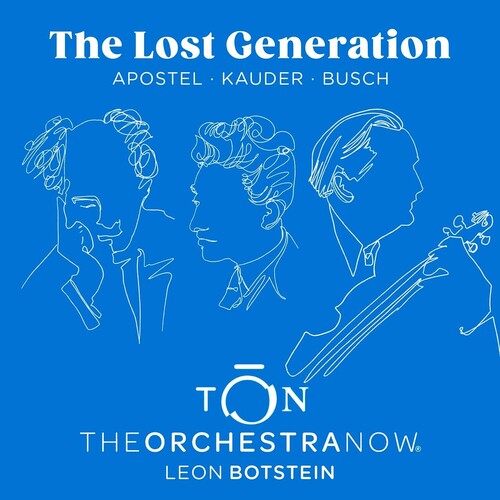Show results for
Deals
- 4K Ultra HD Sale
- Action Sale
- Alternative Rock Sale
- Anime sale
- Award Winners Sale
- Bear Family Sale
- Blu ray Sale
- Blues on Sale
- British Sale
- Classical Music Sale
- Comedy Music Sale
- Comedy Sale
- Country Sale
- Criterion Sale
- Electronic Music sale
- Fantasy Film and TV
- Folk Music Sale
- Hard Rock and Metal Sale
- Horror Sci fi Sale
- Jazz Sale
- Kids and Family Music sale
- Kids and Family Sale
- Metal Sale
- Music Video Sale
- Musicals on Sale
- Mystery Sale
- Naxos Label Sale
- Page to Screen Sale
- Paramount Sale
- Pop and Power Pop
- Rap and Hip Hop Sale
- Reggae Sale
- Rock and Pop Sale
- Rock Legends
- Soul Music Sale
- TV Sale
- TV Sale
- Vinyl on Sale
- War Films and Westerns on Sale

Lost Generation
- Format: CD
- Release Date: 6/7/2024

Lost Generation
- Format: CD
- Release Date: 6/7/2024
- Composers: Adolf Busch, Hans Erich Apostel, Hugo Kauder
- Label: Avie
- UPC: 822252268423
- Item #: 2638517X
- Genre: Classical
- Release Date: 6/7/2024

Product Notes
If you've seen the Leonard Bernstein biopic "Maestro", you've seen and heard The Orchestra Now, the exceptional ensemble that appears in the movie's Tanglewood Music Festival scene. The Orchestra Now (TON), a New York-based graduate-level training orchestra comprised of the most vibrant young musicians from around the globe, was founded by conductor, educator and music historian Leon Botstein, whose insatiable curiosity has resulted in rescuing countless musical works from oblivion. Their first recording for AVIE, "The Lost Generation", brings together three German-speaking composers who were contemporaries of Arnold Schoenberg and Alban Berg, but whose music became supressed by historical events of the 20th century.
In November 2022, Botstein and TON gave the US premiere of Hugo Kauder's Symphony No. 1, a "splendid" work that "made a splash" (New York Classical Review). The largely self-taught Moravian-born composer had a distinguished career in Vienna until he was forced to flee the Nazis and arrived in New York in 1938. The first of Kauder's five symphonies was dedicated to Alma Mahler. Whilst his musical language is rooted in the tradition of Johannes Brahms and Gustav Mahler, he forged an individual voice with his ease and flexibility of harmonic and metrical shifts. German-born, Austrian composer Hans Erich Apostel studied with Schoenberg and Berg. His works incorporated his mentors' expressionism and 12-tone methods in equal measure. The Nazis deemed Apostel's music "degenerate", but he lived out his life in Vienna until his death in 1972. His Variations on a theme by Haydn, performed frequently in the mid-20th century, is an homage to the second movement of Haydn's Symphony No. 103, the "Drum Roll, which itself comprises variations on a theme. Adolf Busch, one of the most celebrated violinists and chamber musicians of the 20th century, was also a prolific composer. A staunch opponent of Nazism, he left his native Germany, arriving first in Switzerland and eventually the United States in 1939. A late Romantic compositional style imbues his Variations on an Original Theme, originally for piano four hands and presented to his wife as a Christmas present in 1944. Busch's longtime chamber music partner and son-in-law, the pianist Rudolf Serkin, frequently performed the work with his son Peter, who made this orchestration of his grandfather's composition, in a familial labor of love.
